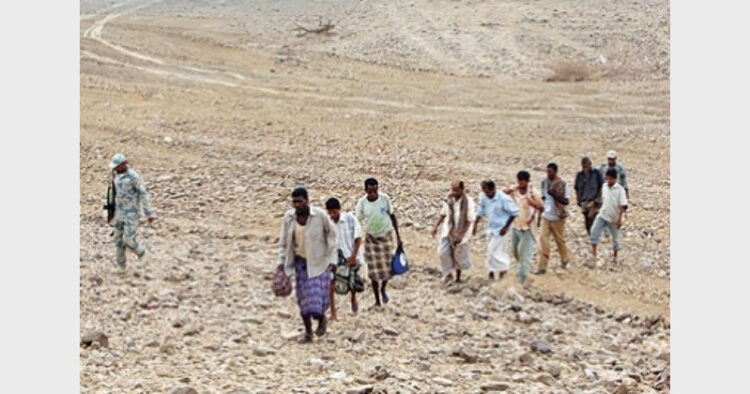Asim Kumar Mitra
During the recent Panchayat election campaign in the borders and coastal areas of West Bengal all parties, without any exception, highlighted three basic problems of the area—infiltration, human trafficking and cross border smuggling. These problems are so serious that one cannot afford to ignore them. The border security force have put their hands off in tackling infiltration and smuggling as they are not allowed to open fire against the infiltrators and smugglers.
In the face of such grim realities, the need of the hour is action and not just mere promises during poll campaigns. “Smuggling and human trafficking are the main problems in our area. I will not deny that many people are involved in smuggling. I have requested the border security force personnel to be more alert. But they have told me that they are not allowed to open fire. Unless they are empowered to pull the trigger, criminals from Bangladesh will continue to infiltrate here and torture the residents in the border areas,” said Beena Mondal, a local Trinamool Congress MLA.
Smuggling of cattle in thousands are taken across the border into Bangladesh where they are slaughtered. This is another area of great concern. “It is far more profitable to smuggle cattle now than it was a few years ago. I used to get Rs. 50 per cattle, but the amount has now increased to Rs. 250,” said Jamal Ali, a cattle-smuggler.
Way back in 2011, just after the 26/11 terrorist activities in Mumbai, Mr. Debendra Kumar Sikri, special secretary to the census department attached to the Central Home Ministry, wrote to Mr. Ashok Mohan Chakravorty, chief secretary of West Bengal, that the central government has undertaken a series of action programmes to tide over this kind of unforeseen attacks by the terrorist groups. It was mentioned in that letter that there are 3331 villages in the coastal area of West Bengal. It covers both North & South 24-Parganas districts and East Midnapur district. It was informed that first of all in these districts of coastal area a genuine citizenship register would be made up. Proposal was to formulate one National Population Register. One spokesperson from the central Home Department confided that the 26/11 terrorist attack on Mumbai had focused on the totally unguarded and free for all coastal borders of West Bengal including Sunder bans. Intelligence agencies had already informed our government that Bangladeshi Islamic terrorist groups were very much active and hand in glove with the terrorists to inflict number of terrorist acts in India. Sunder bans is being used by the Bangladeshi Islamic terrorists as the corridor for entering into India.
This is the reason why identifying Indian citizens has become all the more necessary. So central Home Department had proposed to set up at least 6 new coastal police stations and in addition to these 17 new police outposts should also be established in the coastal area. In the proposed police stations at least two in each coastal area would be equipped with modern AK series of weapons. Each coastal district would be provided with two most modern and well equipped launches or power-boats.
In this connection, it is worth mentioning here that the state government has also put forward a proposal to set up 12 new police stations in coastal area as the Bangladeshi infiltrators are taking advantage of this coastal route to enter into India. It is surprising that more than five thousand Bangladeshi infiltrators have been put up behind bars in these three coastal districts. Their presence in other jails of the West Bengal is equally astonishing. This has been experienced by the workers of NPR or National Population Register, when approached two blocks of Murshidabad district, it was found that more than 60 per cent people could not produce any document to prove that they are Indian citizens. It is unfortunate that as these people belonged to a particular minority group, our so called secular government had liberalized certain rules meant for not to strictly follow them in the case of these people. Even after that, 18 per cent of them could not prove that they are Indian citizens.
Even the central government has proposed to abolish the special passport system between Bangladesh and India. On the one hand the security of the country is being jeopardized by the Bangladeshi Islamic terrorists, and on the other the other, the central home ministry has expressed their desire to withdraw the special passport system between two countries as the central government thinks that for all practical purposes there is no need of passport to travel both countries.
West Bengal government has already rejected this proposal. On the contrary, the state government has suggested modernising the special passport system between West Bengal and Bangladesh where points like “security of the country” should be given proper importance. Decision on the subject is still kept pending.














Comments